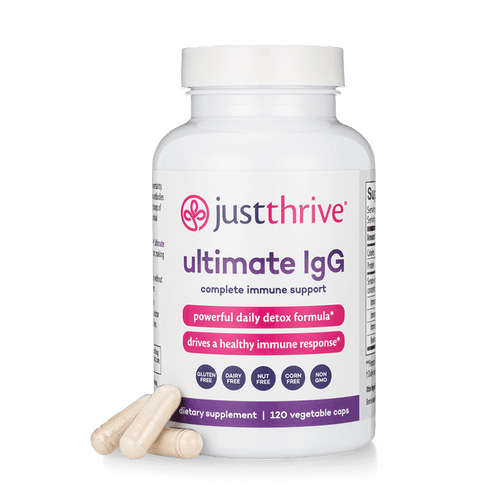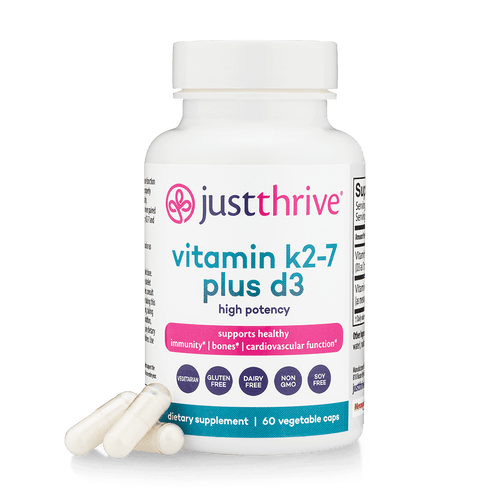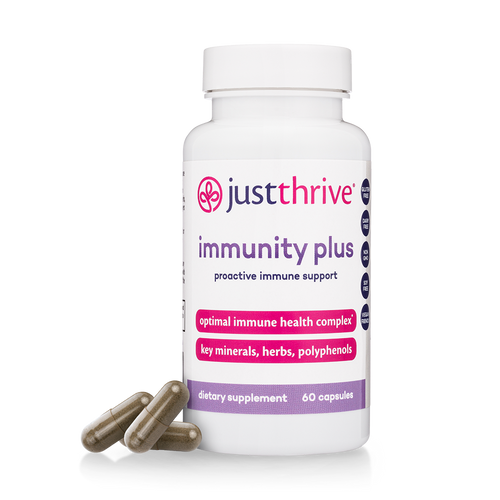Allergies are more than just a nuisance; they can be downright painful and disruptive. And according to statistics, the number of people who suffer with allergies is only going up.
According to 2021 reports from The National Center for Health Statistics, about one quarter of American adults and nearly 1 in 5 children suffer from seasonal allergies.[1]
The cost of allergic rhinitis is between $3–4 billion each year.[2]
The AAMC also reported in 2024 that "climate change could significantly increase airborne pollen loads, even in areas that now have low loads, by 2050."[3]
So clearly, allergies are nothing to sneeze at.
And certainly, nobody WANTS to struggle through a chronic or seasonal allergic episode. That’s why the average consumer runs straight for an over-the-counter and/or prescription medication to find relief.
These solutions, while occasionally effective, can quickly rack up considerable out-of-pocket costs, and, they’re often a package deal with a number of difficult side effects such as drowsiness, medicine-head, brain fog, and even blurred vision.
Fortunately, nature has equipped you and I with a number of natural solutions that can offer less stuffy days and congested nights. Below, you’ll find 12 of my favorite natural remedies to help you fight the good fight against allergies...
1. LOCAL Raw Honey

Honey produced in and around the area where you live works better to relieve allergies because it contains traces of your local pollen. Over time your body will start to build an immunity to the pollen, which can eventually lead to relief. In concept, this is similar to the idea of getting allergy shots. Make sure to check (and double check) where the honey is produced so you know you’re getting something truly LOCAL.
Aim to have a couple tablespoons per day (it’s sweet, so, that shouldn’t be too much of a stretch).
2. Apple Cider Vinegar

Apple cider vinegar is known in natural health circles for its many immune supporting properties. It can help balance the bodies’ PH, break up mucus, and even support lymphatic drainage. Experts recommend mixing one to two tablespoon of apple cider vinegar with a glass of water.
That makes for a pretty ‘stiff’ drink. Unless you have a palette of steel, I recommend adding 1 tablespoon of lemon juice and a half tablespoon of local raw honey.
Pro Tip: Drink the mixture through a straw to protect the enamel on your teeth.
3. Vitamin A

Apart from immune support, vitamin A is also an important nutrient for vision, growth, and reproduction. Vitamin A also has antioxidant properties, which helps protect the cells of your body from damage caused by free radicals. Free radicals are nasty little buggers and are responsible for a whole host of health challenges, including allergies.
Vitamin A is naturally found in many foods, such as spinach and liver. If you’re not too keen on those food choices though, supplementation could be an option for you. The standard recommended daily intake is 900 micrograms (mcg) for adult men and 700 mcg for adult women.
Or, as an even more effective option, you might consider a probiotic supplement that supports your body's own antioxidant (and vitamin A) production. More on that later...
4. Zinc & Selenium
Zinc is an important trace mineral, and is renowned for the role it plays in immune function. But did you know? It also assists with wound healing, and many natural health practitioners believe that it can offer excellent allergy support. I’ve also found that supplementing with Zinc helps me to address adrenal fatigue caused by stress.
Add to that selenium, another under-looked trace mineral, has a strong influence on your immune and inflammatory responses and antioxidant activity, all of which are vital to fighting seasonal allergies. Together, zinc and selenium form a immune powerhouse.
The Mayo Clinic recommends 8 milligrams (mg) for women and 11 mg for adult men (though your naturopathic doctor may have you on more).[4]
For selenium, adolescent and adult males should get 40–70 mcg per day, and adolescent and adult females should get 45–55 mcg per day.[5]
5. Drink Water

People think of histamine as the cause of allergies—and rightly so! This, of course, is the reason why people reach for antihistamines to relieve allergy symptoms. What most people don’t know is that histamine is also in charge of water regulation in the body. It is less active when the body is fully hydrated and it becomes increasingly active when the body becomes dehydrated. So, moral of the story is that drinking more water (aim for 8 glasses a day MINIMUM), can positively impact your sensitivity to allergies!
6. Bromelain
Bromelain is an enzyme found in papaya and pineapple. I remember years ago when I had my wisdom teeth removed, my dentist told me to eat a half of a pineapple two nights before surgery, and the other half the night before. Clearly, she was onto something.
Homeopathic doctors have long since known bromelain to be an effective anti-inflammatory, and research has shown that it's effective in addressing allergy-related respiratory distress.
For allergy support, the typical recommendation is between 500 to 2,000 mg daily, divided into 2 or 3 doses, but this can vary from person to person[6], so it's best to consult your general practitioner for personalized guidance.
7. Vitamin C
We all know that Vitamin C helps support your immune system. But it’s also been proven to act as a natural antihistamine. Several studies found that oxidative stress (cell damage from free radicals) plays a key contributing role in the body’s allergic response.[7,8] Because vitamin C is a powerful antioxidant (a natural free radical fighter), it most certainly can have a positive impact on allergies.
Most major media outlets will tell you that the optimal daily dose to address health challenges is 750 mg, but in my experience, more Vitamin C is better. That said, please do check with your health professional before starting any new supplement regimen.
8. Organic Veggies

Your mother was right—eat more veggies! Organic (please, please, please eat organic) veggies such as, cabbage, beets, carrots and yams can do wonders in the allergy department.
And my personal fave, watercress, is a very potent antihistamine that can easily be used in salads or sautéed in coconut oil and garlic.
Also, let’s not forget to include horseradish, onions, and ginger. Ginger can be particularly helpful because it helps to warm the body and break down toxins (and added benefit—it assists with digestion).
9. Essential Oils
Essential oils are a great an alternative or complementary treatment for allergy relief. They’re derived from plants and can be used in a variety of ways including diffusing them into the air, using them in a bath, and/or applying them (diluted) directly to the skin.
My personal allergy go-to’s for diffusing are eucalyptus, lavender, and peppermint oil. I’ve found that they really help to open up my nasal passages and increase circulation.
Note: If you have pets—especially if you plan to diffuse the oils—be sure to check for safety concerns, as certain types can be toxic.
10. HEPA filters
Okay, maybe this one isn’t “natural” in the strictest sense, but I felt it had to be included on the list. Running a high-quality air purifier in your home can really help with allergy symptoms. If you’re in the market for a filter, make sure to look for a high-efficiency particulate air (HEPA) filter that traps airborne irritants such as pollen, dust, and pet dander. This is a great way to help reduce all sorts of allergens in your home and make everything more comfortable.
11. Keep Your Windows Closed

We as humans need fresh air; there’s no two ways around it. And when it starts to warm up, it's tempting to open your windows at night, right?
But if you’re in the middle of a big, nasty fight with seasonal allergies, resist that urge! When your windows are open, it lets all that pollen into your home. As much as I can stand, I like to keep my windows closed during problematic allergy months to keep the air in my house clean.

12. Probiotics
After the birth of my youngest child, I started to get seasonal allergies. Having never had allergies before in my life, this was quite the unexpected and unwanted gift!
As any mother can attest, pregnancy can do crazy things to the body… As far as your internal system is concerned, one of the biggest areas that gets thrown out of whack is the bacteria in your gut (the gut microbiome). The rise in estrogen and progesterone during pregnancy can disrupt the balance of the good and bad bacteria, increasing vulnerability to pathogens.
Once I learned how my gut was being impacted, I began my quest for the best researched brand of probiotics available on the market. That’s how I found Just Thrive. The proprietary strains in Just Thrive Probiotic are custom designed by nature to arrive 100% alive in the intestines. This is huge because if a probiotic can’t survive past the harsh stomach acid (and 99% of brands on the market can’t), their ability to create positive change is minimal.
Just Thrive Probiotic also helps your body produce antioxidants right at the site of peak absorption, and as if been reading to this point, you know how key that is to managing allergies. In fact, one of the four clinically-proven strains in Just Thrive, Bacillus indicus HU36, has been shown to generate 15 distinct orange and yellow antioxidant pigments, creating a sort of super-charged carotenoid “cocktail.”[9]
Within a few weeks of taking Just Thrive, I felt fantastic! It’s truly amazing what can happen when you focus on supporting the health of your gut.
Remember, approximately 70–80% of your immune response lives in your gut, so it’s no stretch to say that gut health can have a dramatic impact on your overall health!
I would go as far as to say, if you are going to one thing on this list to help your allergies and overall health, it would be to make Just Thrive Probiotic a regular part of your health regimen.
In Conclusion...
Fortunately for us, there are many natural ways to address and garner relief from allergies. I hope you’ve found my list useful, and I very much hope one or all of these solutions work for you! Good luck!
Brook from Moms on the Clock
@momsontheclock
Beat Allergies With Just Thrive
Enjoy every season with healthy immune responses. A healthy, well-balanced gut microbiome could be the solution you’ve been hoping for. And the easiest way to keep your gut in tip top shape is with spore-based probiotics.
Just Thrive Probiotic & Antioxidant supports a diverse gut microbiome where beneficial bacteria can flourish, supporting healthy inflammatory responses.
Just Thrive Probiotic contains four clinically studied spore probiotics shown to promote a balanced, bacterially-diverse gut microbiome:
- Bacillus indicus HU36™
- Bacillus subtilis HU58™
- Bacillus coagulans
- Bacillus clausii
And for the critical trace minerals, zinc and selenium, Immunity Plus has got your back. Additionally, Immunity Plus features herbs, polyphenols, and postbiotics for proactive gut and immune support. It counteracts damage from oxidative stress to promote a healthy inflammatory response and a swift recovery.
>> Embrace allergy season with Just Thrive Probiotic and Immunity Plus.
Not sure about trying Just Thrive? We can help with that!
EVERY Just Thrive purchase is covered by our Bottom of the Bottle, 100% money back guarantee.
So you can try Just Thrive Probiotic and Immunity Plus to see if they work for you… and we’re betting you’ll notice a positive difference.
But if for any reason you’re not completely satisfied, simply ask for a full product refund at any time. Even if it’s been 3 months… or 3 years. Even if the bottle is empty! You’ll get your money back, no questions asked.
>> Test drive Just Thrive Probiotic and Immunity Plus 100% RISK FREE TODAY, and save on your first month’s subscription with code SUB30.
Sources
- Centers for Disease Control and Prevention, National Center for Health Statistics. More than a quarter of U.S. adults and children have at least one allergy. Last reviewed January 26, 2023. Accessed April 1, 2025. https://www.cdc.gov/nchs/pressroom/nchs_press_releases/2022/20220126.htm
- Asthma and Allergy Foundation of America. Allergy facts. Reviewed April 2024 by James JM, MD. Accessed April 1, 2025. https://aafa.org/allergies/allergy-facts/
- Balch B. Do seasonal allergies seem to be getting worse? Blame climate change. AAMC. Accessed April 1, 2025. https://www.aamc.org/news/do-seasonal-allergies-seem-be-getting-worse-blame-climate-change
- Mayo Clinic. Zinc. Published March 26, 2025. Accessed April 1, 2025. https://www.mayoclinic.org/drugs-supplements-zinc/art-20366112
- Mayo Clinic. Selenium supplement (oral route). Last updated February 1, 2025. Accessed April 1, 2025. https://www.mayoclinic.org/drugs-supplements/selenium-supplement-oral-route/description/drg-20063649
- Wyndly. Effective allergy relief: unpacking bromelain's potential. Updated March 11, 2025. Accessed April 1, 2025. https://www.wyndly.com/blogs/learn/bromelain-for-allergies
- Albano GD, Gagliardo RP, Montalbano AM, Profita M. Overview of the Mechanisms of Oxidative Stress: Impact in Inflammation of the Airway Diseases. Antioxidants (Basel). 2022;11(11):2237. Published 2022 Nov 13. doi:10.3390/antiox11112237
- Moon H, Sim C, Lee J, Oh I, An T, Lee J. A Prospective Study on the Association between Oxidative Stress and Duration of Symptoms in Allergic Rhinitis. J Pers Med. 2021;11(12):1290. Published 2021 Dec 3. doi:10.3390/jpm11121290
-
Sy C, Dangles O, Borel P, Caris-Veyrat C. Interactions between Carotenoids from Marine Bacteria and Other Micronutrients: Impact on Stability and Antioxidant Activity. Mar Drugs. 2015;13(11):7020-7039. Published 2015 Nov 19. doi:10.3390/md13117020













